- Serbia
Get to know Serbia
- Citizens
Culture and science
Health services
Pension and disability insurance
- Business
Employment
Economy
- Media
- Government
- Contact
Keep in touch
Contact form
Back
Keepin touch
Whether you have a question, comment, suggestion or any problem in the purview of the government, send us your message and we will try to respond as soon as possible. If your problem is not in our purview, we will forward your message to the relevant institution.
Q:
A:
Serbian government reaches preliminary agreement with IMF
Belgrade,
26 April 2004
Serbian Deputy Prime Minister Miroljub Labus said that a Serbian government delegation has reached a preliminary agreement with the International Monetary Fund (IMF) to draw $140 million in another two tranches in June this year.
Speaking at a press conference organised by the Serbia-Montenegrin Embassy in Washington last night, Labus said that this agreement sends out a positive signal to potential foreign investors. He added that Montenegro will also join the arrangement in a move that will secure better international position for the state union.
The Deputy Prime Minister said that the agreement has a very important political aspect, because the government defended its economic policy and gained support from the IMF's Board of Governors.
Serbian Minister of Finance Mladjan Dinkic said that the agreement with the IMF is a significant turning point in Serbia's economic development, since the last arrangement with this financial institution was concluded in July last year. After that, economic reforms in Serbia were significantly slowed down, and a political crisis emerged due to bad economic policy.
Speaking about details of the agreement with IMF, Dinkic said that the government will increase budgetary revenue in order to cut the budget deficit from 3.6 percent to 2.5 percent of GDP, that is from 45 billion to 30 billion dinars.
Dinkic pointed out that the agreement with IMF will send a message to business people that the government will continue with efforts to cut spending and improve fiscal discipline.
The measures that will be used for pulling revenues into the state budget will be collecting tax on games of chance, which has been legally introduced but is not paid, as well as introducing higher tax rates for those who have big apartments in city centres. Property tax rates will not be changed for those with lower income.
Dinkic said that the Law on value added tax should come into force on January 1, 2005, adding that the Ministry of Finance will insist on consistent tax collection, as well as on further reduction of grey economy through strict application of laws and better organisation of the Tax Administration and the Customs Office.
The Minister of Finance told the Tanjug news agency that he met with the Director General of the Council of Economics and Finance Ministers of the European Union (Ecofin) Klaus Ribling yesterday, and agreed that the EU's macrofinancial assistance should be unblocked. He specified that the third tranche of the macrofinancial aid worth €25 million, which was blocked because Serbia did not have an agreement with the IMF for almost a year, could be expected already in June.
Dinkic said that an Ecofin delegation should visit Belgrade in May. Along with the €25 million in aid, Serbia is likely to receive another €70 million by late November this year.
According to Dinkic, International Financial Corporation (IFC) Director Peter Woicke said at a meeting with the Serbian government delegation that IFC will offer assistance in the upcoming process of Serbian bank sector privatisation. IFC will also provide soft loans to private companies, especially those that are export-oriented, to help the country develop the private sector.
The Serbian government delegation, which is attending the 2004 World Bank and IMF Spring Meetings in Washington, is scheduled to meet with World Bank President James Wolfensohn and IMF Acting Managing Director Anne Krueger later today.
The Deputy Prime Minister said that the agreement has a very important political aspect, because the government defended its economic policy and gained support from the IMF's Board of Governors.
Serbian Minister of Finance Mladjan Dinkic said that the agreement with the IMF is a significant turning point in Serbia's economic development, since the last arrangement with this financial institution was concluded in July last year. After that, economic reforms in Serbia were significantly slowed down, and a political crisis emerged due to bad economic policy.
Speaking about details of the agreement with IMF, Dinkic said that the government will increase budgetary revenue in order to cut the budget deficit from 3.6 percent to 2.5 percent of GDP, that is from 45 billion to 30 billion dinars.
Dinkic pointed out that the agreement with IMF will send a message to business people that the government will continue with efforts to cut spending and improve fiscal discipline.
The measures that will be used for pulling revenues into the state budget will be collecting tax on games of chance, which has been legally introduced but is not paid, as well as introducing higher tax rates for those who have big apartments in city centres. Property tax rates will not be changed for those with lower income.
Dinkic said that the Law on value added tax should come into force on January 1, 2005, adding that the Ministry of Finance will insist on consistent tax collection, as well as on further reduction of grey economy through strict application of laws and better organisation of the Tax Administration and the Customs Office.
The Minister of Finance told the Tanjug news agency that he met with the Director General of the Council of Economics and Finance Ministers of the European Union (Ecofin) Klaus Ribling yesterday, and agreed that the EU's macrofinancial assistance should be unblocked. He specified that the third tranche of the macrofinancial aid worth €25 million, which was blocked because Serbia did not have an agreement with the IMF for almost a year, could be expected already in June.
Dinkic said that an Ecofin delegation should visit Belgrade in May. Along with the €25 million in aid, Serbia is likely to receive another €70 million by late November this year.
According to Dinkic, International Financial Corporation (IFC) Director Peter Woicke said at a meeting with the Serbian government delegation that IFC will offer assistance in the upcoming process of Serbian bank sector privatisation. IFC will also provide soft loans to private companies, especially those that are export-oriented, to help the country develop the private sector.
The Serbian government delegation, which is attending the 2004 World Bank and IMF Spring Meetings in Washington, is scheduled to meet with World Bank President James Wolfensohn and IMF Acting Managing Director Anne Krueger later today.
-
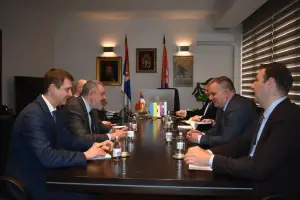 Belgrade, 11 February 2026
Belgrade, 11 February 2026Ample space for advancing cooperation with Ukraine in field of education
-
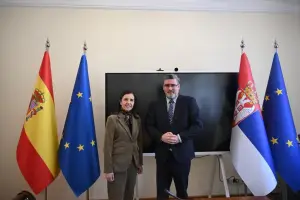 Belgrade, 11 February 2026
Belgrade, 11 February 2026Spain’s support for Serbia’s European path
-
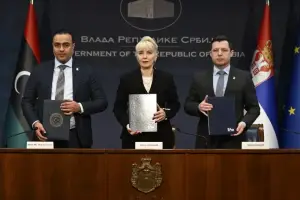 Belgrade, 10 February 2026
Belgrade, 10 February 2026Libya’s participation in Expo 2027 confirms strong bilateral relations
-
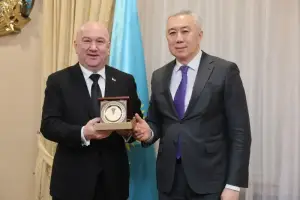 Belgrade/Astana, 10 February 2026
Belgrade/Astana, 10 February 2026Potential for advancing cooperation with Kazakhstan in multiple sectors
-
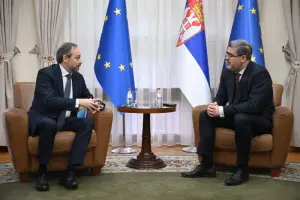 Belgrade, 10 February 2026
Belgrade, 10 February 2026Serbia fully committed to implementation of reforms
-
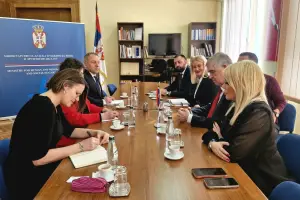 Belgrade, 9 February 2026
Belgrade, 9 February 2026Partnership with Romania in solving issues of importance to citizens
-
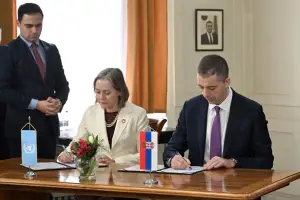 Belgrade, 9 February 2026
Belgrade, 9 February 2026UN-Republic of Serbia Sustainable Development Cooperation Framework 2026-2030 signed
-
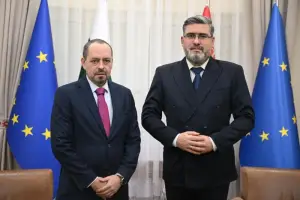 Belgrade, 9 February 2026
Belgrade, 9 February 2026Support of neighbouring countries of great importance for Serbia’s European integration process
-
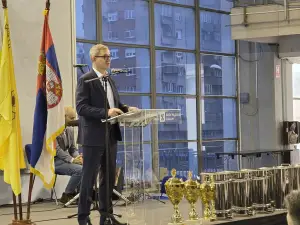 Belgrade, 7 February 2026
Belgrade, 7 February 2026Solid foundations for long-term, systemic development of beekeeping laid
-
 Belgrade/Brussels, 6 February 2026
Belgrade/Brussels, 6 February 2026Serbia's full readiness to cooperate with EC to accelerate reform implementation


